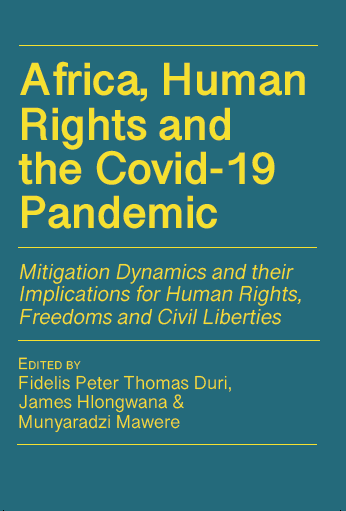Publisher: Langaa RPCIG, Cameroon
Pages: 512
Year: 2023
Category: African Studies, Anthropology, Human & Civil Rights, Politics, Social Sciences
Dimensions: 229 x 152mm
Mitigation Dynamics and their Implications for Human Rights, Freedoms and Civil Liberties
This book makes a significant contribution by initiating debate on the state of human rights, freedoms and civil liberties in the context of emergencies such as pandemics in general and Covid-19 in particular. It is without doubt that as the world was preoccupied with combating the Covid-19 pandemic, issues of rights, freedoms and liberties in the context of this struggle increasingly came under close scrutiny. In many African countries, there were concerns about Covid-19 containment measures being enforced brutally by state security operatives such as the army, the police and the intelligence officers. Considerable debate also arose on whether the infringements that took place in an effort to thwart the pandemic were justifiable on health and moral grounds. The book makes an important claim that the fight against Covid-19 was marred by the abuse of power by many ruling elites who weaponised and repurposed pandemic curtailment provisions to taper democratic space by solidifying autocracy through muzzling political opponents, gagging the press and instituting various socio-political control mechanisms beyond public health concerns. In addition, cases abound of Covid-19 containment protocols being instrumentalised to subvert electoral processes, scuttle popular protests and extinguish opposition political activity. Undoubtedly, this book illustrates that the global struggle against Covid-19 was also very much a war for the respect of basic freedoms, human rights and civil liberties, thereby highlighting the need to establish a sustainable interaction between pandemic dynamics and human rights. The book is for students and practitioners across fields, but most especially in history, law, political science, development studies, philosophy, social anthropology and sociology.
Price range: £42.00 through £49.00
About the editors
Fidelis Peter Thomas Duri is a Senior Lecturer of History in the
Department of Archaeology, Culture and Heritage, History and Development
Studies at Great Zimbabwe University.
James Hlongwana is a Senior Lecturer of History in the Department of History, Archaeology and Development Studies at Great Zimbabwe University in Zimbabwe.
